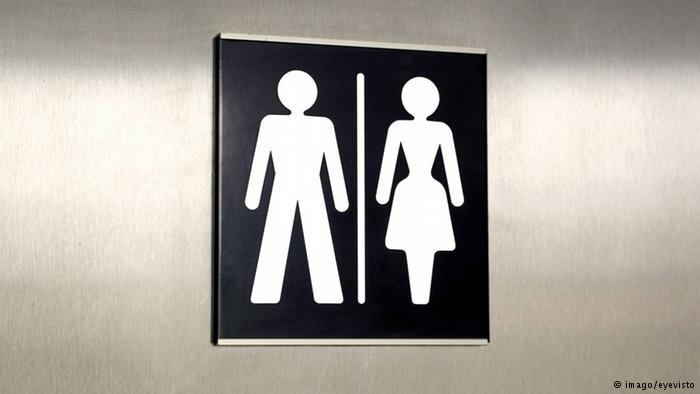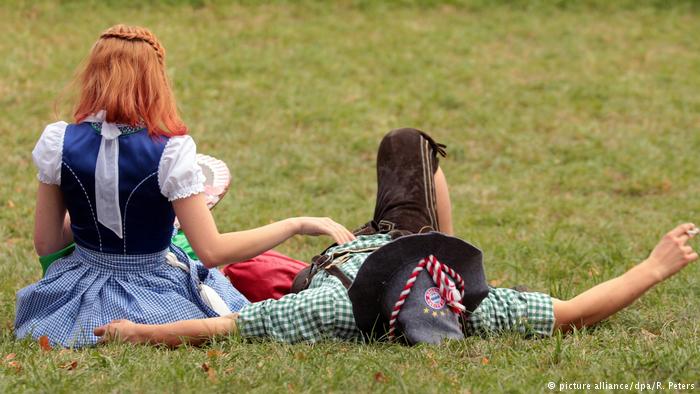Opinion: Sexism is Germany’s hidden secret
Casual sexism has become a hidden part of German culture, says DW’s Kate Brady. She takes a look at the country’s stereotyped gender roles – from Mummy Merkel, to glib dirndl comments, and even gender-specific sausages.
Germany has boomed in popularity in recent years. It’s Europe’s powerhouse. It’s driven. It’s inventive. It’s hip. But it also has a sexist secret which is blemishing gender roles and representations in society.
Following the 2013 Brüderle-gate uproar, when top liberal Free Democrat politician Rainer Brüderle commented how well a female journalist could “fill out a dirndl,” it looked as though Germany could finally address one of the country’s largely hidden pitfalls which had become embedded in its culture. However, the German media still leaves much to be desired in catching up in the fight to stamp out casual sexism.
In a country where a married woman has legally been allowed to accept a job against her husband’s wishes only since 1977, it comes as little surprise that, particularly among the more conservative quota of Germany’s older generation, I often have the impression that defending your opinion as a woman remains “improper” – to the extent that one woman once described it to me as “unladylike.”
Unlike the public sexism of lecherous stares and wolf-whistling which I’d unfortunately become accustomed to in daily life in Britain, in Germany it appears to be rooted much deeper in conservative traditions.
Mummy Merkel
German Chancellor Angela Merkel has become known as the nation’s Mummy
As the country with the longest-serving female leader currently in office, it would have been logical to think that Germany had come on in leaps and bounds in accepting women in roles of leadership and power.
But the press haven’t give Angela Merkel her credit where it was due. Since coming to power in 2005, she has been dubbed as “Mutti” – Germany’s “Mummy.” Despite all the positive connotations associated with motherhood, I doubt very much that Germany would have referred to former Chancellor Gerhard Schröder as “Vati” or “Daddy.”
In similar fashion, as Merkel celebrated her 60th birthday in July last year, the German media went to town, providing the nation with a plethora of accounts of the chancellor’s life. Many chose to run similar headlines to that of the Stuttgarter Zeitung which read, “From Kohl’s little girl to the nation’s Mummy,” – failing to highlight any of her achievements prior to being appointed as Federal Minister for Women and Youth in 1991 under Chancellor Helmut Kohl, or any since for that matter.
Political target
Television, as the number one mass media outlet, has without doubt the greatest influence on impressions and misconceptions of gender representations in Germany. But earlier this month, when Katja Suding – leader of the liberal Free Democrats in the city state of Hamburg – appeared on the “Tagesschau” television news program, Germany’s national public broadcaster, ARD, chose to transport the nation to a largely bygone era of 1980s television production. From behind the scenes, one camera man decided to treat Germany’s viewers to a panning shot over the politician’s legs – a perspective of Suding which many viewers deemed as sexist.
Apologizing to Suding on the “Tagesschau” blog, ARD current affairs chief editor Kai Gniffke, admitted: “I assume that camera shot was produced by someone from the school and spirit of past decades, who found this portrayal particularly attractive.”
The ‘Wurst’ in Promotion
Advertising in Germany has also been a top contributor to categorizing gender image in recent years.
Sausage Nation: Can Bratwurst be gender-specific?
“Sex sells,” as advertisers and consumers are seemingly never allowed to forget.
But it is by no means only women who are subjected to “passive sexism” in the promotion of products in Germany.
German supermarket Edeka was one of the big names to come under fire after it launched a range of “his and hers” Bratwurst sausages, which critics claimed were promoting sexual stereotyping.
The mens’ sausages, marketed as “hearty and strongly-spiced” were not only larger, but also cheaper than the women’s which were advertized as “lean.”
In a parting shot to pull in the wurst-loving nation, the men’s packaging also featured the image of a woman and the ladies’ featured a pectoral-flexing male – leaving the poor man to be pulled apart like a piece of meat.
Own goal
Ferrero Deutschland, the offspring of the Italian chocolate giant of the same name, has also caused a stir on numerous occasions since launching its “gender-specific” Kinder Surprise eggs back in 2012. The pink “girl” egg, with the slogan “only for girls” was later followed up by a series of confectionary eggs which included a “World Cup footballer” egg and a “Footballer’s wife” egg.
The company’s Facebook page was inundated with complaints that Ferrero was categorizing what was deemed as suitable for boys and girls.
Cultural sexism?
When the employment discrimination law was adopted at European Union member level in 2000, several German lawyers rejected the two directives, claiming that there was no sexism in Germany. Day-to-day tell-tale signs, however, show that the widespread tradition of specific gender roles remains very much an issue in Germany’s media outlets. The largely hidden attitude of casual sexism, which has become a subtly engrained part of Germany’s culture, appears to be being drip-fed into society and remains ignored in many quarters.
But if it doesn’t pick up the pace, Germany may soon be left behind with 20th century gender relations, while the rest of us pursue a life of gender equality.
Author: Kate Brady
Editor: Marjory Linardy









